Transferts monétaires et mobilité humaine
Les transferts monétaires sont souvent utilisés lors de crises afin de répondre aux besoins des personnes migrantes. Dans cette page, vous trouverez des ressources sur les transferts monétaires et la migration.

La Croix-Rouge se prépare à fournir une aide humanitaire aux migrant·es de la caravane sur le point de quitter le Honduras pour le Guatemala.
©Johannes Chinchilla / FICR.
Conflits, crises économiques et catastrophes sont autant de raisons ayant contraint des personnes à fuir et à traverser des frontières dans des conditions éprouvantes et risquées, en quête de sécurité et de moyens de subsistance. En 2020, le nombre de personnes déplacées de force s’est envolé au niveau sans précédent de plus de 80 millions de personnes, soit près du double du nombre enregistré il y a une dizaine d’année. Cette tendance s’aggrave et les effets du changement climatique menacent de déplacer jusqu’à 200 millions de personnes d’ici 2050.
L’assistance monétaire est de plus en plus utilisée afin de répondre aux besoins des personnes en situation de déplacement. On y a eu recours à grande échelle dans différents contextes de migration, en Europe en 2015 jusqu’au Venezuela pour « los caminantes ». Elle a également été utilisée dans d’autres crises migratoires, notamment en Amérique centrale, au Sahel, en Méditerranée et dans la Corne de l’Afrique. L’assistance monétaire est à l’heure actuelle l’une des principales formes d’aide apportée aux populations déplacées en Ukraine et dans les pays voisins.
Il existe une myriade de perspectives et de définitions concernant le mot « migrant·e » et la façon dont les humanitaires doivent agir. C’est pourquoi nous ne choisissons pas une définition unique pour le moment, étant donné que les discussions sur l’assistance monétaire et la migration en sont encore à leurs prémices et que le langage évolue encore.
Documenter et partager les données probantes donnera lieu à des interventions plus efficaces. Cette page contient une sélection de ressources utiles concernant la migration et le recours à l’assistance monétaire. Elle sera mise à jour au fil des discussions ayant lieu dans les espaces humanitaires des transferts monétaires.
Priorités actuelles
Afin de contribuer aux progrès relatifs à cet enjeu, nous nous engageons à :
- soutenir la création de données probantes aux niveaux régional et mondial ;
- contribuer aux solutions pratiques visant à mettre en œuvre les transferts monétaires auprès des personnes migrantes ;
- organiser des discussions sur les enjeux majeurs basées sur des données probantes.
Contenu récent

Cash Transfer Programming for Syrian Refugees: Lessons Learned on Vulnerability, Targeting, and Protection from the Danish Refugee Council’s E-Voucher Intervention in Southern Turkey
Report
DRC Turkey is currently implementing a two-year, DFID-funded project that aims to provide immediate support to and strengthen the coping mechanisms of vulnerable non-camp Syrian refugees in southern Turkey. The first phase of the project focused on identifying and providing monthly cash transfers (in the...

Know Your Customer Standards and Privacy Recommendations for Cash Transfers
Guidelines and Tools
This report reviews how Know Your Customer (KYC) standards – rules designed to combat criminal money laundering and terrorism financing – are applied in humanitarian cash programs. The report examines the practices of aid agencies and their processing of the personal information of...

EMMA Toolkit
Report
Download the publication file here EMMA is a set of tools (this toolkit) and guidance notes (the reference manual on CD-ROM). It encourages and assists front-line humanitarian staff in sudden-onset emergencies to better understand, accommodate, and make use of market systems. It does not offer a...
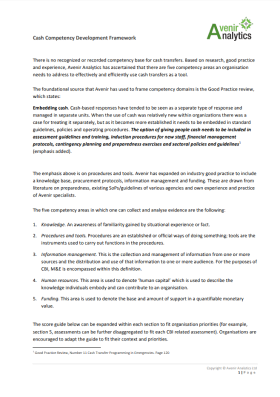
Cash Competency Development Framework
Guidelines and Tools
There is no recognized or recorded competency base for cash transfers. Based on research, good practice and experience, Avenir Analytics has ascertained that there are five competency areas as an organisation needs to address to effectively and efficiently use cash transfers as a tool.
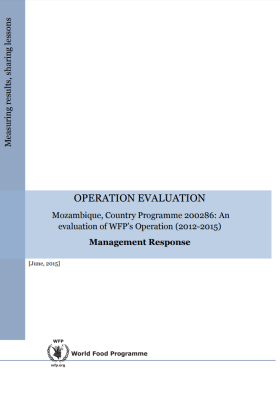
Mozambique, Country Programme 200286: An evaluation of WFP’s operation (2012-2015) – Management Response
Report
The final evaluation covers WFP’s country programme (CP) 200286 (2012-2015). It was intended for both accountability and learning purposes and focuses on assessing: the appropriateness and coherence of the operation its results the factors explaining the results. The evaluation assessed the...

Cost-Effectiveness Analysis of Cash-Based Food Assistance Projects: A case study and discussion paper of findings in Niger
Report
Despite recent and expanding literature on cost effectiveness and value for money, there is little by way of guidance for the implementation of cost-effectiveness analysis in humanitarian and development programming. This report distills findings from the literature on ex post cost-effectiveness analysis,...

Tips for Protection in Cash based interventions
Guidelines and Tools
This document presents a set of general tips to identify, monitor and mitigate protection risks and maximize protection benefits of cash-based interventions.
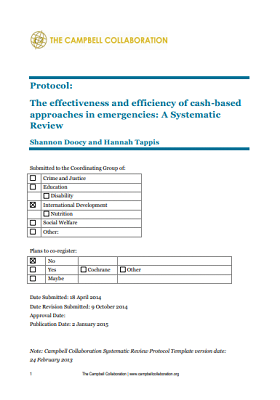
The Effectiveness and Efficiency of Cash-Based Approaches in Emergencies: A Systematic Review
Report
To access a document detailing the background, literature review, and objectives related to this review, please click here. Cash-based approaches have been used for development purposes for a number of decades, particularly within social protection interventions in low- and middle-income countries. Over...
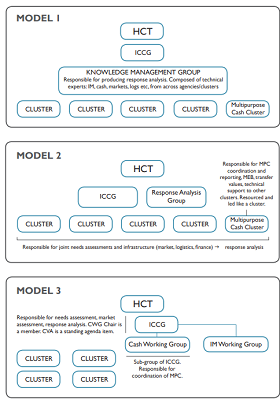
Coordination Diagrams
Guidelines and Tools
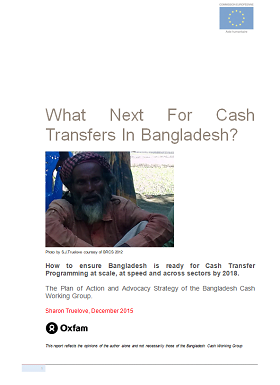
What Next For Cash Transfers In Bangladesh?
Report
This study was commissioned by the Cash Working Group (CWG) of Bangladesh and funded, through Oxfam by ECHO. The study was conducted through remote interviews and then further interviews and participatory workshops during ten days in Dhaka (November 2015). The scope of work was initially primarily focused...
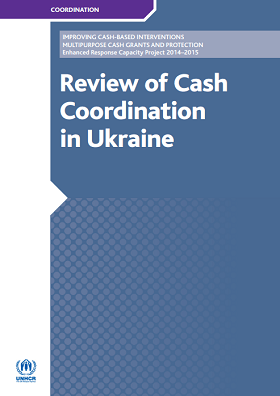
Review of Cash Coordination in Ukraine
Report
Ukraine is a lower middle-income country in Eastern Europe, with a strong soviet era legacy in the field of social protection. Since early 2014, Ukraine has been affected by conflict in its eastern part, which led to the internal displacement of more than 1.4 million people. At the time this paper was

Seeking Solutions: New roles for technology in cash and voucher programs – An inspiration brief for technology and private sector partners
Policy paper
Today, more people have been forced to flee their homes than at the height of World War II. The scale of these humanitarian crises are challenging, and sometimes outpacing, the capacity of institutions created to respond to them. Yet, the approaches we have available to reach populations in need have also...

The Impact of Cash Transfer Programmes on Protection Outcomes in Afghanistan
Report
Although cash-based interventions (CBIs) are increasingly used to deliver humanitarian assistance in support of more traditional in-kind emergency distributions, there is now a growing, global acceptance among stakeholders of the need to pay closer attention to the positive and negative impact of CBIs on...

Challenges and the State of Play of Interoperability in Cash Transfer Programming
Guidelines and Tools
This study explores the factors driving the design of interoperability for Cash Transfer Programming. It outlines the rapidly changing environment in which digital services are emerging, the types of digital collaborations that could be enabled, and the key design challenges that confront effective...
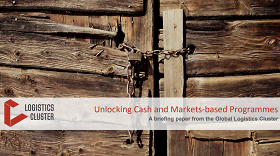
Unlocking Cash and Markets-Based Programmes
Report
In the aftermath of an emergency, humanitarian agencies are increasingly recognising the value of cash and voucher modalities, and market engagement. For Logistics and Supply Chain, our roles are evolving to embrace this trend, adapting our ways of working and even take on new responsibilities. Many...

Cash in Emergencies Toolkit
Guidelines and Tools
Access Toolkit Here Cash transfer based programming (CTP) is an effective and flexible way to support people affected by emergencies, maintaining their dignity and choice, while fostering local economies. CTP includes all forms of cash and voucher-based assistance. The Cash in Emergencies Toolkit has been...

Key Recommendations for Protection in Cash-based Interventions
Guidelines and Tools
This document outlines the key recommendations to ensure that protection is mainstreamed throughout the project cycle for cash-based interventions.
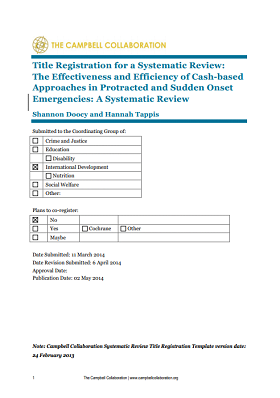
The Effectiveness and Efficiency of Cash-based Approaches in Emergencies: A Systematic Review (Background and Objectives)
Report
This document provides the background, literature review, and objects of the review itself, which is available here. Cash-based approaches have been used for development purposes for a number of decades, particularly within social protection interventions in low- and middle-income countries. Over the...

Liberia Ebola Response
Presentation
ICRCs EVD Cash response program had to be designed under a rare circumstance of insufficient baseline data on EVD impact on household level and limited opportunity to contact intended beneficiaries for a detailed assessment/ proper situational analysis.
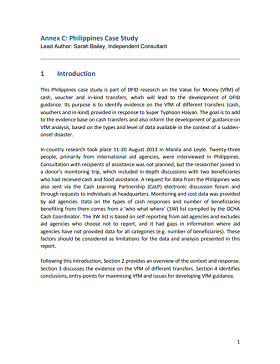
Annex C: Philippines Case Study
Report
This Philippines case study is part of DFID research on the Value for Money (VfM) of cash, voucher and in-kind transfers, which will lead to the development of DFID guidance. Its purpose is to identify evidence on the VfM of different transfers (cash, vouchers and in-kind) provided in response to Super...